formerly eScholarship Editions


|
|
|
|
Your request for similar items found 20 book(s). | Modify Search | Displaying 1 - 20 of 20 book(s) | |
| 1. | 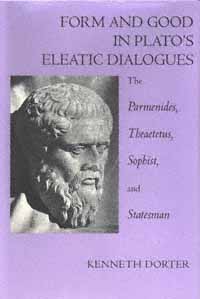 | Title: Form and good in Plato's Eleatic dialogues: the Parmenides, Theaetetus, Sophist, and Statesman Author: Dorter, Kenneth 1940- Published: University of California Press, 1994 Subjects: Classics | Philosophy | Classical Literature and Language Publisher's Description: In this innovative analysis, Plato's four eleatic dialogues are treated as a continuous argument. In Kenneth Dorter's view, Plato reconsiders the theory of forms propounded in his earlier dialogues and through an examination of the theory's limitations reaffirms and proves it essential. Contradicted are both those philosophers who argue that Plato espoused his theory of forms uncritically and those who argue that Plato in some sense rejected the theory and moved toward the categorical analysis developed byAristotle. Dorter's reexamination of Plato's insights implies an important new direction for modern philosophical inquiry. [brief] Similar Items |
| 2. | 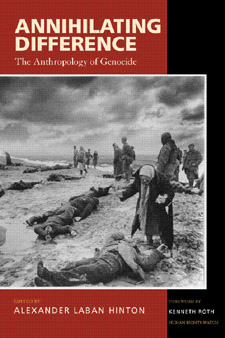 | Title: Annihilating difference: the anthropology of genocide Author: Hinton, Alexander Laban Published: University of California Press, 2002 Subjects: Anthropology | African Studies | Asian Studies | Ethnic Studies | Gender Studies | History | Sociology | Media Studies | Religion | Religion Publisher's Description: Genocide is one of the most pressing issues that confronts us today. Its death toll is staggering: over one hundred million dead. Because of their intimate experience in the communities where genocide takes place, anthropologists are uniquely positioned to explain how and why this mass annihilation occurs and the types of devastation genocide causes. This ground breaking book, the first collection of original essays on genocide to be published in anthropology, explores a wide range of cases, including Nazi Germany, Cambodia, Guatemala, Rwanda, and Bosnia. [brief] Similar Items |
| 3. | 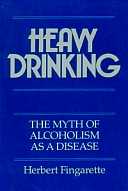 | Title: Heavy drinking: the myth of alcoholism as a disease Author: Fingarette, Herbert Published: University of California Press, 1988 Subjects: Science | Medicine Publisher's Description: Heavy Drinking informs the general public for the first time how recent research has discredited almost every widely held belief about alcoholism, including the very concept of alcoholism as a single disease with a unique cause. Herbert Fingarette presents constructive approaches to heavy drinking, . . . [more] Similar Items |
| 4. | 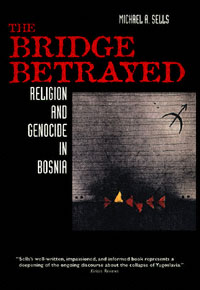 | Title: The bridge betrayed: religion and genocide in Bosnia Author: Sells, Michael Anthony Published: University of California Press, 1996 Subjects: Religion | Politics | European History | Islam | History | Middle Eastern Studies | Jewish Studies | Christianity Publisher's Description: The recent atrocities in Bosnia-Herzegovina have stunned people throughout the world. With Holocaust memories still painfully vivid, a question haunts us: how is this savagery possible? Michael A. Sells answers by demonstrating that the Bosnian conflict is not simply a civil war or a feud of age-old adversaries. It is, he says, a systematic campaign of genocide and a Christian holy war spurred by religious mythologies.This passionate yet reasoned book examines how religious stereotyping - in popular and official discourse - has fueled Serbian and Croatian ethnic hatreds. Sells, who is himself Serbian American, traces the cultural logic of genocide to the manipulation by Serb nationalists of the symbolism of Christ's death, in which Muslims are "Christ-killers" and Judases who must be mercilessly destroyed. He shows how "Christoslavic" religious nationalism became a central part of Croat and Serbian politics, pointing out that intellectuals and clergy were key instruments in assimilating extreme religious and political ideas.Sells also elucidates the ways that Western policy makers have rewarded the perpetrators of the genocide and punished the victims. He concludes with a discussion of how the multireligious nature of Bosnian society has been a bridge between Christendom and Islam, symbolized by the now-destroyed bridge at Mostar. Drawing on historical documents, unpublished United Nations reports, articles from Serbian and Bosnian media, personal contacts in the region, and Internet postings, Sells reveals the central role played by religious mythology in the Bosnian tragedy. In addition, he makes clear how much is at stake for the entire world in the struggle to preserve Bosnia's existence as a multireligious society. [brief] Similar Items |
| 5. | 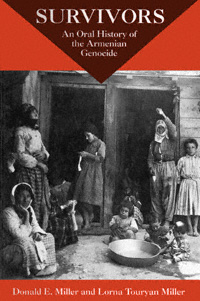 | Title: Survivors: an oral history of the Armenian genocide Author: Miller, Donald E. (Donald Earl) 1946- Published: University of California Press, 1993 Subjects: History | Middle Eastern History | Middle Eastern Studies | Religion Publisher's Description: Between 1915 and 1923, over one million Armenians died, victims of a genocidal campaign that is still denied by the Turkish government. Thousands of other Armenians suffered torture, brutality, deportation. Yet their story has received scant attention. Through interviews with a hundred elderly Armenians, Donald and Lorna Miller give the "forgotten genocide" the hearing it deserves. Survivors raise important issues about genocide and about how people cope with traumatic experience. Much here is wrenchingly painful, yet it also speaks to the strength of the human spirit. [brief] Similar Items |
| 6. | 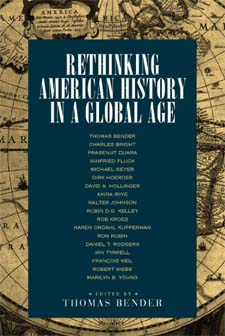 | Title: Rethinking American history in a global age Author: Bender, Thomas Published: University of California Press, 2002 Subjects: History | United States History | Intellectual History | Historiography Publisher's Description: In rethinking and reframing the American national narrative in a wider context, the contributors to this volume ask questions about both nationalism and the discipline of history itself. The essays offer fresh ways of thinking about the traditional themes and periods of American history. By locating the study of American history in a transnational context, they examine the history of nation-making and the relation of the United States to other nations and to transnational developments. What is now called globalization is here placed in a historical context. A cast of distinguished historians from the United States and abroad examines the historiographical implications of such a reframing and offers alternative interpretations of large questions of American history ranging from the era of European contact to democracy and reform, from environmental and economic development and migration experiences to issues of nationalism and identity. But the largest issue explored is basic to all histories: How does one understand, teach, and write a national history even as one recognizes that the territorial boundaries do not fully contain that history and that within that bounded territory the society is highly differentiated, marked by multiple solidarities and identities? Rethinking American History in a Global Age advances an emerging but important conversation marked by divergent voices, many of which are represented here. The various essays explore big concepts and offer historical narratives that enrich the content and context of American history. The aim is to provide a history that more accurately reflects the dimensions of American experience and better connects the past with contemporary concerns for American identity, structures of power, and world presence. [brief] Similar Items |
| 7. | 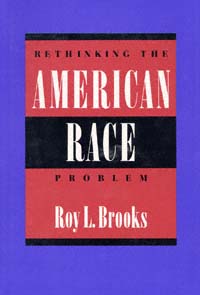 | Title: Rethinking the American race problem Author: Brooks, Roy L. (Roy Lavon) 1950- Published: University of California Press, 1990 Subjects: American Studies | Law | Politics | Ethnic Studies Publisher's Description: If the conservative view of the American race problem is frightening, the traditional liberal view seems impotent. Analyzing the race problem from neither right nor left, Brooks sheds a new and clarifying light on America's longest running social and moral dilemma.This incisive book provides a bold new examination of the seemingly intractable racial problems confronting Americans at the end of the twentieth century. In a wide-ranging and probing study, Brooks calls into question the prevailing wisdom about racism, civil rights legislation, and the composition of the Black community, going on to offer a dramatic new approach to the race problem. In Brooks' mind, civil rights laws - laws targeted at racial discrimination - have not only failed to engender racial equality, but have in fact had a negative effect on the standard of living of many Blacks. Brooks defines the American race problem so as to carefully separate racial oppression from (economic) class oppression and explains how civil rights legislation since the 1960s has hurt Black Americans of every class. He offers a strategy for resolving the country's racial inequities, unique in its attentiveness to class division in Black society, that combines governmental remedies and an unprecedented program of Black self-help.While Brooks argues that the government has the means to resolve the race dilemma, he suggests that it lacks the spirit to do so. Thus, it may be time for Black Americans to come to grips with an unpleasant reality - namely, that they can count on the government only for minimal alleviation, and must take on the larger portion of responsibility for resolving the American race problem themselves.Certain to arouse controversy, Rethinking the American Race Problem offers new understandings of issues often clouded by misconceptions and backward notions. It is an important book for anyone concerned about the current state of race relations in America. [brief] Similar Items |
| 8. | 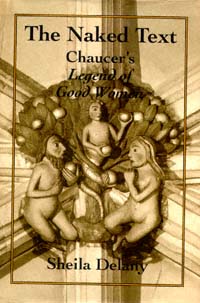 | Title: The naked text: Chaucer's Legend of good women Author: Delany, Sheila Published: University of California Press, 1994 Subjects: Literature | Literary Theory and Criticism | Medieval Studies | English Literature | Gender Studies Publisher's Description: A sequel to her seminal book on Chaucer's House of Fame , Sheila Delany's elegant and innovative study of Chaucer's Legend of Good Women explores what it meant to be a reader and a writer, and to be English and a courtier, in the late fourteenth century. The richness of late medieval art, philosophy, and history are powerfully brought to bear on one of Chaucer's most controversial works. So too are the insights of modern critical theory - semiotics, historicism, and gender studies especially - making this a unique achievement in medieval and Chaucerian studies.Delany's strikingly original readings of Chaucer's Orientalism, his sexual wordplay, his theological attitudes, and his treatment of sex and gender have given us a Chaucer for our time. [brief] Similar Items |
| 9. | 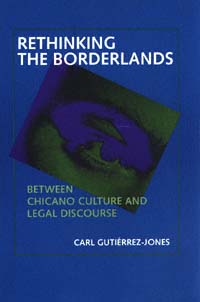 | Title: Rethinking the borderlands: between Chicano culture and legal discourse Author: Gutiérrez-Jones, Carl Scott Published: University of California Press, 1995 Subjects: American Studies | Chicano Studies | Literature | Language and Linguistics | Law | Social and Political Thought | Rhetoric | Postcolonial Studies | United States History | United States History Publisher's Description: Challenging the long-cherished notion of legal objectivity in the United States, Carl Gutiérrez-Jones argues that Chicano history has been consistently shaped by racially biased, combative legal interactions. Rethinking the Borderlands is an insightful and provocative exploration of the ways Chicano and Chicana artists, writers, musicians, and filmmakers engage this history in order to resist the disenfranchising effects of legal institutions, including the prison and the court.Gutiérrez-Jones examines the process by which Chicanos have become associated with criminality in both our legal institutions and our mainstream popular culture and thereby offers a new way of understanding minority social experience. Drawing on gender studies and psychoanalysis, as well as critical legal and race studies, Gutiérrez-Jones's approach to the law and legal discourse reveals the high stakes involved when concepts of social justice are fought out in the home, in the workplace and in the streets. [brief] Similar Items |
| 10. |  | Title: Assembled in Japan: electrical goods and the making of the Japanese consumer Author: Partner, Simon Published: University of California Press, 2000 Subjects: History | Japan | Media Studies | Technology and Society | Consumerism Publisher's Description: Assembled in Japan investigates one of the great success stories of the twentieth century: the rise of the Japanese electronics industry. Contrary to mainstream interpretation, Simon Partner discovers that behind the meteoric rise of Sony, Matsushita, Toshiba, and other electrical goods companies was neither the iron hand of Japan's Ministry of International Trade and Industry nor a government-sponsored export-led growth policy, but rather an explosion of domestic consumer demand that began in the 1950s.This powerful consumer boom differed fundamentally from the one under way at the same time in the United States in that it began from widespread poverty and comparatively miserable living conditions. Beginning with a discussion of the prewar origins of the consumer engine that was to take off under the American Occupation, Partner quickly turns his sights on the business leaders, inventors, laborers, and ordinary citizens who participated in the broadly successful effort to create new markets for expensive, unfamiliar new products.Throughout, the author relates these pressure-cooker years in Japan to the key themes of twentieth-century experience worldwide: the role of technology in promoting social change, the rise of mass consumer societies, and the construction of gender in advanced industrial economies. [brief] Similar Items |
| 11. | 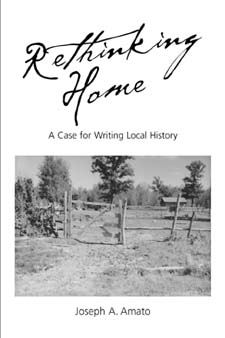 | Title: Rethinking home: a case for writing local history Author: Amato, Joseph Anthony Published: University of California Press, 2002 Subjects: History | Intellectual History | United States History | Writing Publisher's Description: Joseph A. Amato proposes a bold and innovative approach to writing local history in this imaginative, wide-ranging, and deeply engaging exploration of the meaning of place and home. Arguing that people of every place and time deserve a history, Amato draws on his background as a European cultural historian and a prolific writer of local history to explore such topics as the history of cleanliness, sound, anger, madness, the clandestine, and the environment in southwestern Minnesota. While dedicated to the unique experiences of a place, his lively work demonstrates that contemporary local history provides a vital link for understanding the relation between immediate experience and the metamorphosis of the world at large. In an era of encompassing forces and global sensibilities, Rethinking Home advocates the power of local history to revivify the individual, the concrete, and the particular. This singular book offers fresh perspectives, themes, and approaches for energizing local history at a time when the very notion of place is in jeopardy. Amato explains how local historians shape their work around objects we can touch and institutions we have directly experienced. For them, theory always gives way to facts. His vivid portraits of individual people, places, situations, and cases (which include murders, crop scams, and taking custody of the law) are joined to local illustrations of the use of environmental and ecological history. This book also puts local history in the service of contemporary history with the examination of recent demographic, social, and cultural transformations. Critical concluding chapters on politics and literature--especially Sinclair Lewis's Main Street and Longfellow's Hiawatha --show how metaphor and myth invent, distort, and hold captive local towns, peoples, and places. [brief] Similar Items |
| 12. | 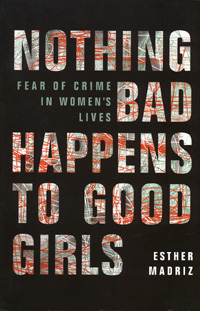 | Title: Nothing bad happens to good girls: fear of crime in women's lives Author: Madriz, Esther 1943- Published: University of California Press, 1997 Subjects: Gender Studies | Sociology | Urban Studies | Women's Studies | Criminology Publisher's Description: "The possibility of being a victim of a crime is ever present on my mind; thinking about it as natural as breathing." - 40-year-old womanThis is a compelling analysis of how women in the United States perceive the threat of crime in their everyday lives and how that perception controls their behavior. Esther Madriz draws on focus groups and in-depth interviews to show the damage that fear can wreak on women of different ages and socioeconomic backgrounds. Although anxiety about crime affects virtually every woman, Madriz shows that race and class position play a role in a woman's sense of vulnerability.Fear of crime has resulted in public demand for stronger and more repressive policies throughout the country. As funds for social programs are cut, Madriz points out, those for more prisons and police are on the increase. She also illustrates how media images of victims - "good" victims aren't culpable, "bad" victims invite trouble - and a tough political stance toward criminals are linked to a general climate of economic uncertainty and conservatism.Madriz argues that fear itself is a strong element in keeping women in subservient and self-limiting social positions. "Policing" themselves, they construct a restricted world that leads to positions of even greater subordination: Being a woman means being vulnerable. Considering the enormous attention given to crime today, including victims' rights and use of public funds, Madriz's informative study is especially timely. [brief] Similar Items |
| 13. | 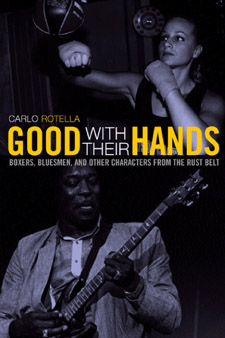 | Title: Good with their hands: boxers, bluesmen, and other characters from the Rust Belt Author: Rotella, Carlo 1964- Published: University of California Press, 2002 Subjects: History | American Studies | Sociology | Literature | Labor Studies | Urban Studies | Ethnic Studies | Gender Studies Publisher's Description: This eloquent, streetwise book is a paean to America's Rust Belt and a compelling exploration of four milieus caught up in a great transformation of city life. With loving attention to detail and a fine sense of historical context, Carlo Rotella explores women's boxing in Erie, Pennsylvania; Buddy Guy and the blues scene in Chicago; police work and crime stories in New York City, especially as they converged in the making of the movie The French Connection; and attempts at urban renewal in the classic mill city of Brockton, Massachusetts. Navigating through accrued layers of cultural, economic, and personal history, Rotella shows how stories of city life can be found in a boxing match, a guitar solo, a chase scene in a movie, or a landscape. The stories he tells dramatize the coming of the postindustrial era in places once defined by their factories, a sweeping set of changes that has remade the form and meaning of American urbanism. A native of the Rust Belt whose own life resonates with these stories, Rotella has gone to the home turfs of his characters, hanging out in boxing gyms and blues clubs, riding along with cops and moviemakers, discussing the future of Brockton with a visionary artist and a pitbull-fancying janitor who both plan to save the city's soul. These people make culture with their hands, and hands become an expressive metaphor for Rotella as he traces the links between their individual talents and the urban scenes in which they flourish. His writing elegantly connects what happens on the street to the larger story of urban transformation, especially the shift from a way of life that demanded individuals be "good with their hands" to one that depends on the intellectual and social skills fostered by formal education and service work. Strong feelings emerge in this book about what has been lost and gained in the long, slow aging-out of the industrial city. But Rotella's journey through the streets has its ultimate reward in discovering deep-rooted instances of what he calls "truth and beauty in the Rust Belt." [brief] Similar Items |
| 14. | 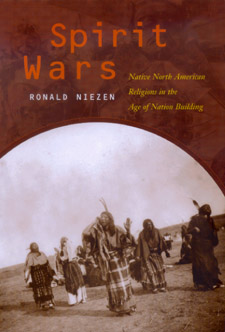 | Title: Spirit wars: Native North American religions in the age of nation building Author: Niezen, Ronald Published: University of California Press, 2000 Subjects: Religion | Cultural Anthropology | Native American Studies | Religion | American Studies | Anthropology Publisher's Description: Spirit Wars is an exploration of the ways in which the destruction of spiritual practices and beliefs of native peoples in North America has led to conditions of collective suffering--a process sometimes referred to as cultural genocide. Ronald Niezen approaches this topic through wide-ranging case studies involving different colonial powers and state governments: the seventeenth-century Spanish occupation of the Southwest, the colonization of the Northeast by the French and British, nineteenth-century westward expansion and nationalism in the swelling United States and Canada, and twentieth-century struggles for native people's spiritual integrity and freedom. Each chapter deals with a specific dimension of the relationship between native peoples and non-native institutions, and together these topics yield a new understanding of the forces directed against the underpinnings of native cultures. [brief] Similar Items |
| 15. | 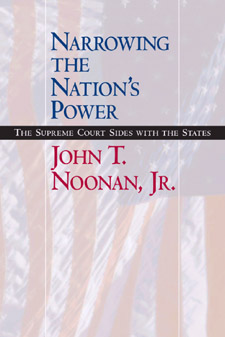 | Title: Narrowing the nation's power: the Supreme Court sides with the states Author: Noonan, John Thomas 1926- Published: University of California Press, 2002 Subjects: Law | American Studies | Political Theory Publisher's Description: Narrowing the Nation's Power is the tale of how a cohesive majority of the Supreme Court has, in the last six years, cut back the power of Congress and enhanced the autonomy of the fifty states. The immunity from suit of the sovereign, Blackstone taught, is necessary to preserve the people's idea that the sovereign is "a superior being." Promoting the common law doctrine of sovereign immunity to constitutional status, the current Supreme Court has used it to shield the states from damages for age discrimination, disability discrimination, and the violation of patents, trademarks, copyrights, and fair labor standards. Not just the states themselves, but every state-sponsored entity--a state insurance scheme, a state university's research lab, the Idaho Potato Commission - has been insulated from paying damages in tort or contract. Sovereign immunity, as Noonan puts it, has metastasized. "It only hurts when you think about it," Noonan's Yalewoman remarks. Crippled by the states' immunity, Congress has been further brought to heel by the Supreme Court's recent invention of two rules. The first rule: Congress must establish a documentary record that a national evil exists before Congress can legislate to protect life, liberty, or property under the Fourteenth Amendment. The second rule: The response of Congress to the evil must then be both "congruent" and "proportionate." The Supreme Court determines whether these standards are met, thereby making itself the master monitor of national legislation. Even legislation under the Commerce Clause has been found wanting, illustrated here by the story of Christy Brzonkala's attempt to redress multiple rapes at a state university by invoking the Violence Against Women Act. The nation's power has been remarkably narrowed. Noonan is a passionate believer in the place of persons in the law. Rules, he claims, are a necessary framework, but they must not obscure law's task of giving justice to persons. His critique of Supreme Court doctrine is driven by this conviction. [brief] Similar Items |
| 16. | 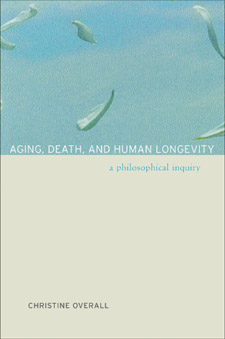 | Title: Aging, death, and human longevity: a philosophical inquiry Author: Overall, Christine 1949- Published: University of California Press, 2003 Subjects: Philosophy | Ethics | Public Policy Publisher's Description: With the help of medicine and technology we are living longer than ever before. As human life spans have increased, the moral and political issues surrounding longevity have become more complex. Should we desire to live as long as possible? What are the social ramifications of longer lives? How does a longer life span change the way we think about the value of our lives and about death and dying? Christine Overall offers a clear and intelligent discussion of the philosophical and cultural issues surrounding this difficult and often emotionally charged issue. Her book is unique in its comprehensive presentation and evaluation of the arguments - both ancient and contemporary - for and against prolonging life. It also proposes a progressive social policy for responding to dramatic increases in life expectancy. Writing from a feminist perspective, Overall highlights the ways that our biases about race, class, and gender have affected our views of elderly people and longevity, and her policy recommendations represent an effort to overcome these biases. She also covers the arguments surrounding the question of the "duty to die" and includes a provocative discussion of immortality. After judiciously weighing the benefits and the risks of prolonging human life, Overall persuasively concludes that the length of life does matter and that its duration can make a difference to the quality and value of our lives. Her book will be an essential guide as we consider our social responsibilities, the meaning of human life, and the prospects of living longer. [brief] Similar Items |
| 17. |  | Title: What price better health?: hazards of the research imperative Author: Callahan, Daniel 1930- Published: University of California Press, 2003 Subjects: Medicine | Philosophy | Public Policy Publisher's Description: The idea that we have an unlimited moral imperative to pursue medical research is deeply rooted in American society and medicine. In this provocative work, Daniel Callahan exposes the ways in which such a seemingly high and humane ideal can be corrupted and distorted into a harmful practice. Medical research, with its power to attract money and political support, and its promise of cures for a wide range of medical burdens, has good and bad sides - which are often indistinguishable. In What Price Better Health?, Callahan teases out the distinctions and differences, revealing the difficulties that result when the research imperative is suffused with excessive zeal, adulterated by the profit motive, or used to justify cutting moral corners. Exploring the National Institutes of Health's annual budget, the inflated estimates of health care cost savings that result from research, the high prices charged by drug companies, the use and misuse of human subjects for medical testing, and the controversies surrounding human cloning and stem cell research, Callahan clarifies the fine line between doing good and doing harm in the name of medical progress. His work shows that medical research must be understood in light of other social and economic needs and how even the research imperative, dedicated to the highest human good, has its limits. [brief] Similar Items |
| 18. | 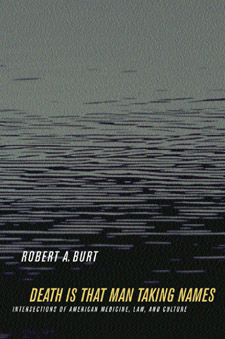 | Title: Death is that man taking names: intersections of American medicine, law, and culture Author: Burt, Robert 1939- Published: University of California Press, 2002 Subjects: Law | Health Care | History of Medicine | Ethics | Religion Publisher's Description: The American culture of death changed radically in the 1970s. For terminal illnesses, hidden decisions by physicians were rejected in favor of rational self-control by patients asserting their "right to die" - initially by refusing medical treatment and more recently by physician-assisted suicide. This new claim rested on two seemingly irrefutable propositions: first, that death can be a positive good for individuals whose suffering has become intolerable; and second, that death is an inevitable and therefore morally neutral biological event. Death Is That Man Taking Names suggests, however, that a contrary attitude persists in our culture - that death is inherently evil, not just in practical but also in moral terms. The new ethos of rational self-control cannot refute but can only unsuccessfully try to suppress this contrary attitude. The inevitable failure of this suppressive effort provokes ambivalence and clouds rational judgment in many people's minds and paradoxically leads to inflictions of terrible suffering on terminally ill people. Judicial reforms in the 1970s of abortion and capital punishment were driven by similarly high valuations of rationality and public decision-making - rejecting physician control over abortion in favor of individual self-control by pregnant women and subjecting unsupervised jury decisions for capital punishment to supposed rationally guided supervision by judges. These reforms also attempt to suppress persistently ambivalent attitudes toward death, and are therefore prone to inflicting unjustified suffering on pregnant women and death-sentenced prisoners. In this profound and subtle account of psychological and social forces underlying American cultural attitudes toward death, Robert A. Burt maintains that unacknowledged ambivalence is likely to undermine the beneficent goals of post-1970s reforms and harm the very people these changes were intended to help. [brief] Similar Items |
| 19. | 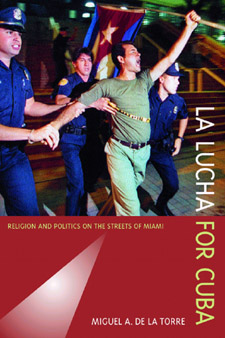 | Title: La lucha for Cuba: religion and politics on the streets of Miami Author: De La Torre, Miguel A Published: University of California Press, 2003 Subjects: Religion | Latino Studies | Politics | Christianity Publisher's Description: For many in Miami's Cuban exile community, hating Fidel Castro is as natural as loving one's children. This hatred, Miguel De La Torre suggests, has in fact taken on religious significance. In La Lucha for Cuba, De La Torre shows how Exilic Cubans, a once marginalized group, have risen to power and privilege - distinguishing themselves from other Hispanic communities in the United States - and how religion has figured in their ascension. Through the lens of religion and culture, his work also unmasks and explores intra-Hispanic structures of oppression operating among Cubans in Miami. Miami Cubans use a religious expression, la lucha, or "the struggle," to justify the power and privilege they have achieved. Within the context of la lucha, De La Torre explores the religious dichotomy created between the "children of light" (Exilic Cubans) and the "children of darkness" (Resident Cubans). Examining the recent saga of the Elián González custody battle, he shows how the cultural construction of la lucha has become a distinctly Miami-style spirituality that makes el exilio (exile) the basis for religious reflection, understanding, and practice - and that conflates political mobilization with spiritual meaning in an ongoing confrontation with evil. [brief] Similar Items |
| 20. | 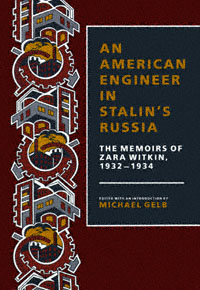 | Title: An American engineer in Stalin's Russia: the memoirs of Zara Witkin, 1932-1934 Author: Witkin, Zara 1900-1940 Published: University of California Press, 1991 Subjects: History | European History | Autobiography | Russian and Eastern European Studies Publisher's Description: In 1932 Zara Witkin, a prominent American engineer, set off for the Soviet Union with two goals: to help build a society more just and rational than the bankrupt capitalist system at home, and to seek out the beautiful film star Emma Tsesarskaia.His memoirs offer a detailed view of Stalin's bureaucracy - entrenched planners who snubbed new methods; construction bosses whose cover-ups led to terrible disasters; engineers who plagiarized Witkin's work; workers whose pride was defeated. Punctuating this document is the tale of Witkin's passion for Tsesarskaia and the record of his friendships with journalist Eugene Lyons, planner Ernst May, and others.Witkin felt beaten in the end by the lethargy and corruption choking the greatest social experiment in history, and by a pervasive evil - the suppression of human rights and dignity by a relentless dictatorship. Finally breaking his spirit was the dissolution of his romance with Emma, his "Dark Goddess."In his lively introduction, Michael Gelb provides the historical context of Witkin's experience, details of his personal life, and insights offered by Emma Tsesarskaia in an interview in 1989. [brief] Similar Items |